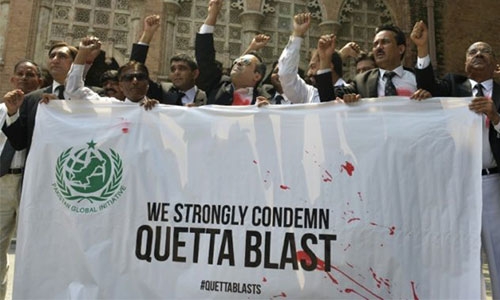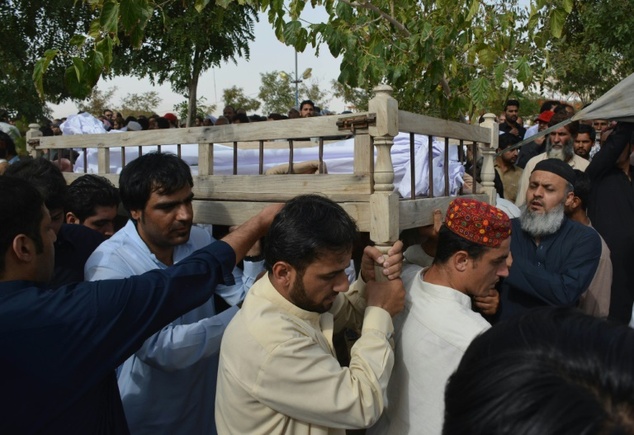Pakistan lawyers strike as dazed city mourns bomb victims
Quetta : Pakistan's lawyers boycotted courts and staged protests nationwide Tuesday after a horrific suicide bombing at a Quetta hospital which killed 70 people including many of their colleagues.
Monday's bloodletting, with medics battling to save scores of injured amid scenes of carnage, left the southwestern city reeling.
Streets were largely empty in the city Tuesday as most public transport shut down, with markets and schools closed in mourning. Police stood guard at the site of the blast at the Civil Hospital.
The explosion came as some 200 lawyers along with journalists gathered there after the fatal shooting of a top provincial lawyer.
The attack has been claimed by both a Pakistani Taliban faction called Jamaat-ul-Ahrar (JuA), and the Islamic State group (IS).
Neither claim has been verified by Pakistani authorities. If IS were behind the attack it would be their deadliest so far in Pakistan, where the group has struggled for purchase.
The Pakistan Bar Council said in a statement before the stoppage Tuesday that lawyers "throughout the country" would take part. Demonstrations were being held in major cities including Islamabad, Karachi and Quetta.
Funerals have already been held for many of the victims. Officials have put the number of wounded at 112.
- Competing claims -
JuA, formed in 2014, also claimed responsibility for Pakistan's deadliest blast so far this year -- the Lahore Easter bombing, which killed 75 -- among other attacks.
The US State Department last week designated JuA a terrorist group, calling it "a splinter group of the Tehreek-e-Taliban Pakistan (TTP) based in the Afghanistan-Pakistan border region".
Hours after the JuA claim the Islamic State group also claimed the attack and said it had killed 200 people, according to IS-linked Amaq news agency. The figure is believed to be exaggerated.
The US has also designated the IS affiliate in Afghanistan and Pakistan -- largely formed from former Taliban members -- a terrorist organisation.
But the Middle Eastern jihadists have struggled in Pakistan due to competition from well established extremist groups such as the Taliban. Attacks claimed by IS in Pakistan are rare, the most significant being a 2015 bus assault in Karachi that killed 44 people.
The group has made some inroads in Afghanistan, where it has carried out attacks in the east near the border with Pakistan in a tussle for supremacy with the Afghan Taliban.
Last month IS claimed twin suicide bombings that left 80 people dead in Kabul, the deadliest attack in the city since 2001.
But officials denied that it marked a turning point for the group there, saying it is under heavy pressure in its eastern strongholds from US airstrikes and an Afghan ground offensive.
Senior analyst Rahimullah Yousafzai poured doubt on both claims to the Quetta bombing, saying there was little previous evidence of JuA or IS being active in Balochistan province. But he added that suicide bombers can strike anywhere, so "we cannot rule it out".
The claims may not be competing at all, he added, suggesting the possibility of a joint attack. "Nothing is concrete." The security situation in Balochistan is already murky and confused.
The province, which borders Iran and Afghanistan, has major oil and gas resources, but is afflicted by Islamist militancy, sectarian violence and a separatist insurgency.
Pakistan's army said the attack was "specially targeting CPEC", referring to China's ambitious $46 billion infrastructure project linking its western province of Xinjiang to the Arabian Sea via Pakistan.
The China-Pakistan Economic Corridor is set to culminate at the port of Gwadar south of Quetta. Security problems have mired CPEC in the past with numerous separatist attacks, but China has said it is confident the Pakistani military is in control.
The army has repeatedly been accused by international rights groups of abuses in Balochistan.
Related Posts


